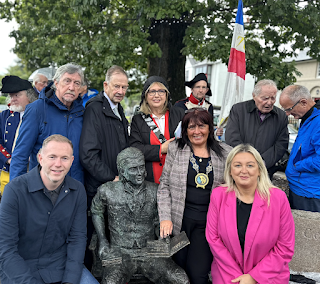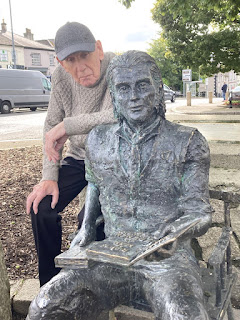Catherine Pollock, Catherine Cooke and Alison Wallace in Derry
We must listen to each other
Efforts by the British
government and the unionist parties to stymie the conversation on future
constitutional change has actually brought a greater focus on the growing
momentum around the upcoming unity referendum. The criticism of An
Taoiseach Leo Varadkar by the British Secretary of State and a range of
unionist voices for daring to suggest that a United Ireland will happen in his
lifetime is the latest example of unionist and Tory efforts to delegitimise the
goal of Irish Unity.
In their view it is not acceptable
to promote Irish Unity. This is presented by them as dangerous and
destabilising and is criticised and condemned with contempt. The
intention is to create a row so that United Irelanders will be quiet and to misrepresent
republican and nationalist aspirations as second class. Nonsense, bluster
and feigned outrage will not stop the conversation about the future. Listening
and learning makes more sense.
Twenty five years ago the
Good Friday Agreement acknowledged the “equally legitimate,
political aspirations” of nationalists and unionists. The talks participants,
including the Irish and British governments, and subsequently the majority of
citizens in a referendum, accepted that the future had to be one based on
partnership, equality and mutual respect. The Agreement recognised the
birthright of all the people of the North to identify themselves and to be
accepted as Irish or British. A referendum process was agreed to determine the
future constitutional shape of the island of Ireland
The DUP and the Tory government do not accept these
principles. That much is clear. They want to delay and dilute the changes that
are coming. But in their hearts they know they cannot stop them. That much is
clear also. The unity genie is out off the bottle. It is not going in
again.
In recent weeks Sinn Féin’s Commission on the Future of Ireland has held two very successful public events. One was at the Ploughing Championship last week in Laois.
This put a focus on the benefits
that Irish unity will bring to rural Ireland. The other event was held in Derry
where three women from the unionist section of our community participated in an
event billed as: “Exploring Northern Protestant Identities and Culture in a
Shared Future.” The three participants – all community based activists -
Catherine Pollock, Catherine Cooke and Alison Wallace are from that broad
tradition.
The event was very informative and the three women
spoke eloquently of the concerns and of the diversity of opinions and
traditions that exist within unionism. Speaking afterward Chairperson of the
event, Catherine Pollock said that she hoped those who attended would begin to
understand the “diversity of feeling, traditions and culture among the unionist
communities.” The conversation ranged across how people can engage and move
forward in civic and political conversations, on the environment, a citizens
Assembly on education, the marching bands and much more. Catherine Cooke hoped
that what they said would provide food for thought: “I came in feeling very
nervous but leave feeling very good.” Alison Wallace said: “People listened and
We need more of these events, of these
conversations. Irish republicans and nationalists must listen carefully and
attentively to what our Protestant/Unionists neighbours are saying in all of
their diversity. And we need to plan for the future.
Thus far the Sinn Féin Commission has held eight
public events, as well as sectoral engagements. Two more will be held by the
Commission in the coming months. There will be a Peoples’ Assembly in Waterford
on 12 October and another through Irish in the Galway Gaeltacht in November.
Incidentally during a recent visit to New York An Taoiseach Leo Varadkar
met US President Joe Biden. He said Mr Biden was very well informed on Irish
affairs and that he asked if there was any way he could help. Mr Varadkar says:
“I told him we had no specific ask at the moment …”
It’s little wonder the British government
disrespects the Irish government the way it does. An Taoiseach needs to listen
and learn also. And to work with those who are prepared to help. In Ireland.
And internationally.
My Big Toe
Jim Donnelly is a Springhallion.
His mother, May Donnelly, was one of the indomitable warrior women from the Upper Springfield who faced down hordes of
British soldiers and RUC officers for decades while also combatting poverty and
discrimination and rearing a good family. These mighty women are to be found in
communities everywhere. The local ones are too many to name but I remember them
all and I am grateful for their friendship and protection and comradeship. And
I am always uplifted by the tenacity and good humour of these working class
heroines, mostly mothers of large families, including Mrs Donnelly.
 Little wonder then that she
has a central role in Jim Donnelly’s book - My Big Toe. Jim is a community
activist from Springhill. Like many of his neighbours he is also a former
prisoner -he did nine years hard time. His life as a community
activist is dedicated, again like many others, to tackling
inequalities and developing a better society for all with a particular focus on
young people especially through his role as joint CEO with the Active Communities
Network.
Little wonder then that she
has a central role in Jim Donnelly’s book - My Big Toe. Jim is a community
activist from Springhill. Like many of his neighbours he is also a former
prisoner -he did nine years hard time. His life as a community
activist is dedicated, again like many others, to tackling
inequalities and developing a better society for all with a particular focus on
young people especially through his role as joint CEO with the Active Communities
Network.
Jim’s journey through writing was
a difficult one. At school he was dismissed as ‘slow at everything he
does.’ He says he became like a ghost in the classroom. ‘I was there
but no one really noticed’.
In prison he read a lot. With
great difficulty. Ditto with his writing. It was a struggle. After his release
from prison he endured anxiety, depression and mental health issues. He then
went on to do a Higher Professional Diploma in Counselling. As part of this
course he had to keep a journal. This enabled him to explore his life and his
experiences. Later he studied for a Masters Degree. Again more reading and
writing. More challenges.
Jim almost abondoned this work because it was too hard for him but his tutor got him to talk to an educational psychologist. She told him he was dyslexic. He understood then why he had such a hard time with reading and writing, why school work was so difficult. This gave him the impetus to complete his masters degree - a great accomplishment for a disadvantaged lad from Springhill. Jim is one of the many men and women who succeeded against the odds. In all kinds of ways. In all sectors. And our children or grandchildren have done even better.
Jim’s book - poems and
prose- came to be published through the efforts of his friends
especially Danny Barkley. When Jim began writing on his phone he shared his
musings on WhatsApp
with Danny, Harry Connolly, Conor , Louise and other friends and family. Danny
thought Jim’s
work should be published. He talked to Harry about this but didn’t tell Jim, probably as Jim acknowledges
because “I
wouldn’t
have been convinced”. My
Big Toe was published as a gift to Jim by his friends.
So well done Danny and
company.
My Big
Toe is brutally honest reflection on life growing up under military
occupation, in a large poor working class family in a republican community in
the time of conflict. It is frank about the traumas, hardships and indignities.
The ups and downs. But it is also funny and full of love. My Big Toe is a tale
of redemption. When I asked Jim how people can get a copy he laughed
and said “Send
them to Danny Barkley”.
My Big Toe is available in limited numbers from the author at Active Communities Network, Twin Spires, Falls Road.

Well done to the people of
Rostrevor who last week invited former President Mary McAleese to unveil a
bronze statue to Tom Dunn – the Peasant Patriot - a local hedge school master
and United Irish leader who taught ‘The Rights of Man’ by Tom Paine and the
writings of Wolfe Tone to local patriots. In 1797 Tom’s barn was raided by the
British and he was captured. He refused to name any of his comrades. He was
ordered to be lashed. He died, aged 62, after 260 lashes. Think about that dear
readers. 260 lashes.




No comments:
Post a Comment